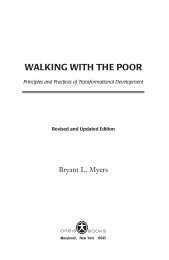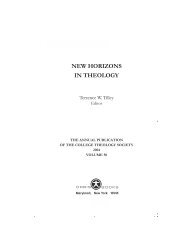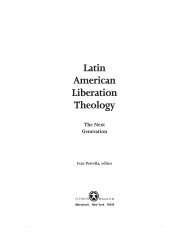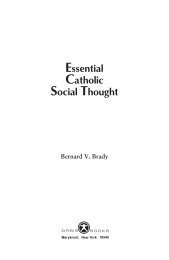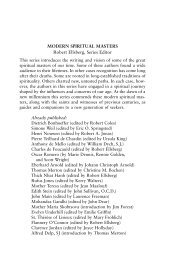CONCEPTS OF MISSION - Orbis Books
CONCEPTS OF MISSION - Orbis Books
CONCEPTS OF MISSION - Orbis Books
Create successful ePaper yourself
Turn your PDF publications into a flip-book with our unique Google optimized e-Paper software.
Mission in Contemporary Missiology 39<br />
• a moral factor: to leave the path of sin (Luke 13:2-3; Acts 3:19; 26:20;<br />
Matt 5:20; Rom 6:2ff.; Eph 4:22). It is an exodus or passage from<br />
darkness to light, from death to life.<br />
• a personal experience with the person of Christ: the meeting with the<br />
person (Jer 3:19, 21, 23ff.) and, in our context, with Christ. In every<br />
conversion, there is the joy of meeting (Luke 15:24; Mark 2:15ff.).<br />
This experience of meeting changes the life of one, and conversion<br />
becomes mission (Acts 9:5, 11; etc.).<br />
• it means making a break: abandoning former values and customs (Acts<br />
6:14; 16:20f.; Gal 4:9). This is the radicality of conversion.<br />
• finally, it means fullness: the converted finds the proper values (culturally,<br />
religiously) “purified and elevated in the church” (AG 9, 11).<br />
What is the part of the missionary in this process of conversion The missionary<br />
has the role of mediator through the proclamation of the gospel<br />
(Mark 6:12; John 17:20). Mediation is necessary in God’s design of salvation.<br />
It does not mean proselytizing, forcing one to convert (AG 13b). The<br />
attitude of the missionary is to offer peace to all (Luke 10:3ff.; Matt 10:16),<br />
and with peace proclaim conversion in Christ. This brings with it a sense of<br />
humility and admiration for the work of God in non-Christians, and respect<br />
for the rhythm of God and humanity (López-Gay 1988, 28).<br />
Conclusion<br />
To conclude this chapter, we indicate again that most of the missiological<br />
themes in the concept of mission are taken up today with more vigor in various<br />
aspects of the so-called new ways of mission: e.g., evangelization, inculturation,<br />
ecumenism, interreligious dialogue, human promotion, etc. (see<br />
Colzani 1996, 55ff.). Furthermore, it is a well-known fact that in the<br />
postconciliar period, in spite of the crisis in missiology, there is great support<br />
and hope for Christian mission (RM 2). Some have described it as the springtime<br />
of Christianity even as we grapple with the negative tendencies. The<br />
period has battled with two dominant questions: the shift in ecclesiology<br />
with its progressive emphasis on mission and its actualizing of the universal<br />
communication that brings to the whole world a unique transformation.<br />
There is also a tendency to provide a Trinitarian and economic reading of<br />
mission and to consider it from a unifying perspective of a salvific dynamism<br />
in the force of which the divine life reaches all and is open to all creatures.<br />
To this must be added the progressive profile of a missiological tendency that<br />
has led to a profound evangelization and humanization. It must be noted,<br />
therefore, that a precise determination of the relationship between the king-




